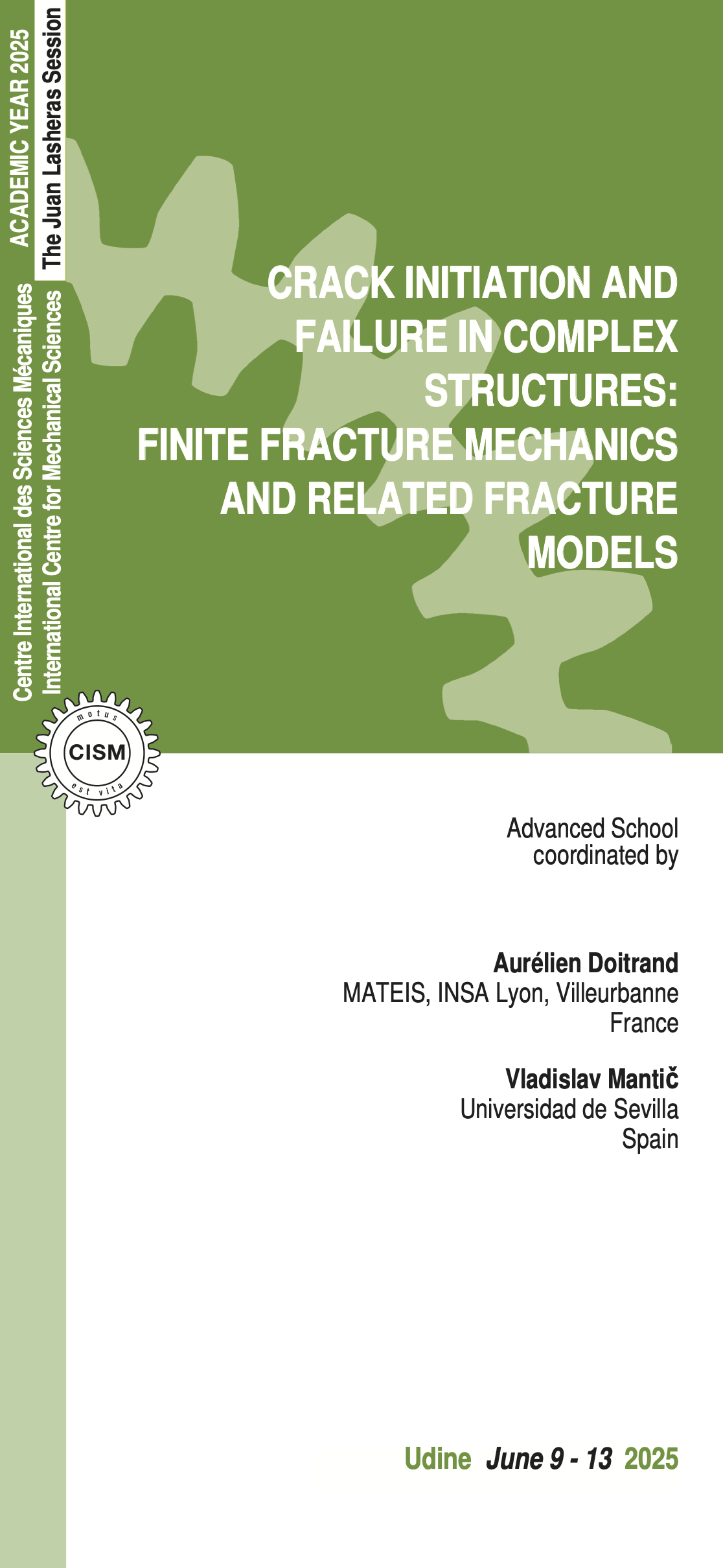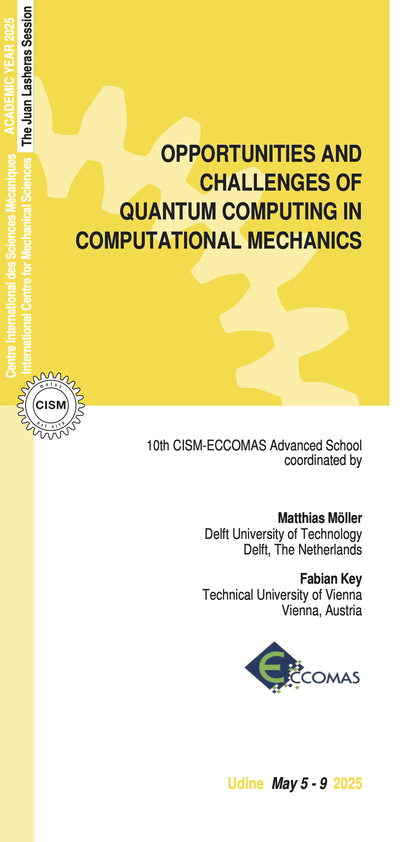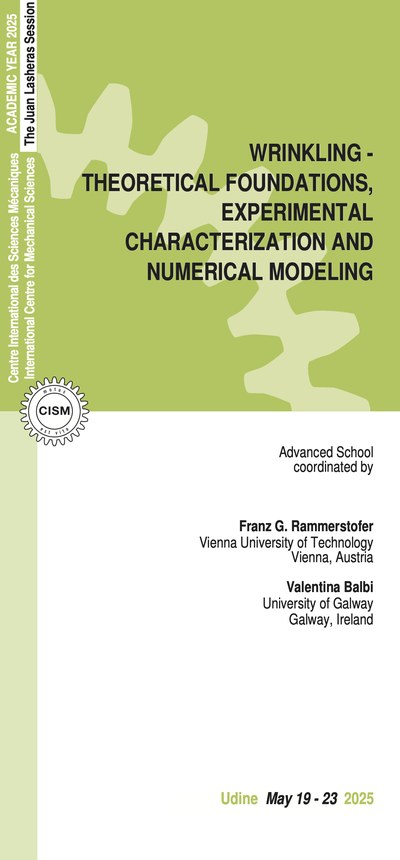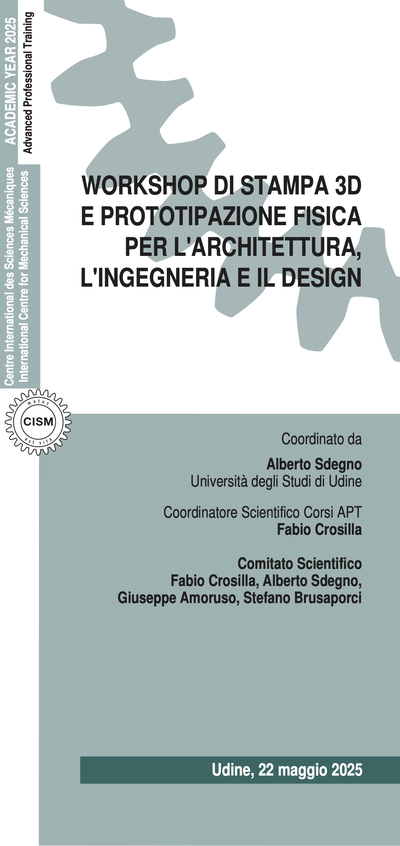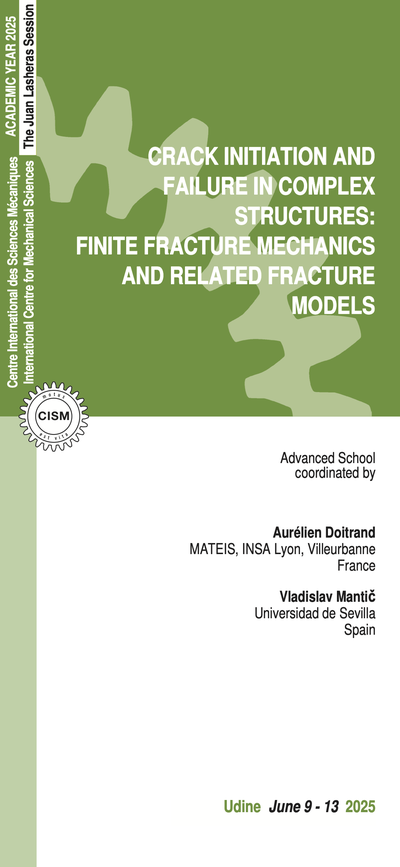This course offers an in-depth exploration of the novel Finite Fracture Mechanics (FFM) technique for modeling crack and failure initiation, with practical applications to real-world problems. It is designed for post-graduate students, expert researchers, and engineers who wish to understand, apply, or develop this approach.
Various theories predict failure initiation in complex structures with stress concentrations or singularities, such as holes or V-notch tips. FFM allows to identify the structure-specific intrinsic length scale and extends the concepts of traditional fracture mechanics to more general configurations with stress concentrations or singulčarities beyond just a crack tip with a square root singularity.
FFM has been validated through numerous experimental observations, successfully predicting failure initiation in complex geometries. In recent years, it has been extended to 3D domains, geometrical and material nonlinearities, and dynamic aspects, including subsonic crack propagation. It has proven effective in assessing fractures at the micro- or nano-scale, in bio-inspired and 3D-printed materials and composites. Additionally, it has provided a physical explanation for the regularization parameter in phase-field models for fracture and established a link with traction-separation profiles of cohesive zone models. These extensions, applications, and interactions with other fracture models make FFM a cutting-edge approach in failure modeling, which will be thoroughly discussed. Practical applications and hands-on exercises will enable participants to master FFM techniques.
The proposed CISM course brings together six researchers who have extensively studied and applied FFM techniques. It will begin by addressing the framework and origin of FFM, including related experimental and theoretical aspects as well as numerical implementation. It will then focus on applications for a wide range of materials and configurations. Recent FFM extensions, including 3D applications, material nonlinearities such as plasticity or nonlinear elasticity, geometrical nonlinearities, dynamic and fatigue loadings, and FFM as an optimization problem, will be covered. The relationship of FFM to other fracture models will also be reviewed in detail.
Leguillon D. (2002). Strength or toughness? A criterion for crack onset at a notch, Eur J Mech- A/Sol 21, 61–72.
Yosibash Z. et al. (2004) Failure criteria for brittle elastic materials, Int J Frac 125, 307-333.
Cornetti P. et al. (2006) Finite fracture mechanics: A coupled stress and energy failure criterion, Eng Frac Mech 73, 2021-2033.
Camanho P.P. et al. (2012) A finite fracture mechanics model for the prediction of the open-hole strength of composite laminates, Compos A 43, 1219–1225.
García I.G. et al. (2014) Transverse crack onset and growth in cross-ply [0/90]s laminates under tension. Application of a coupled stress and energy criterion. Int J Sol Struct 51, 3844–3856.
Mantič V. (2014) Prediction of initiation and growth of cracks in composites. Coupled stress and energy criterion of the finite fracture mechanics. ECCM-16 https://www.researchgate.net/publication/286140141
Weißgraeber P. et al. (2016) A review of Finite Fracture Mechanics: crack initiation at singular and non-singular stress raisers. Arch App Mech 86(1-2),375–401.
Doitrand, A. et al. (2020) Numerical implementation of the coupled criterion: Matched asymptotic and full finite element approaches. Fin Elem Ana Des 168, 103344.
Doitrand A. et al. (2024) A review of the coupled criterion. https://hal.science/hal-04023438/document
4 lectures on:
FFM full finite element implementation, experimental aspects and FFM application to composites.
7 lectures on:
Theory aspects, analytical FFM implementation, FFM applications to joints, plates with holes, axisymmetric configurations, fatigue cracking, T-stress and dialogue between FFM and cohesive zone models.
8 lectures on:
Matched asymptotic expansions, experimental aspects, 3D extension, crack shape determination, multicracking and micro/nano-scale fracture, FFM extension to consider plasticity and FFM extension to dynamics and dialogue between FFM and phase-field approach to fracture.
6 lectures on:
The origin of FFM, theoretical aspects and FFM generalization as an energy minimization approach.
5 lectures on:
The origin of FFM, theoretical aspects, FFM applications to anticracks in snow and FFM extensions to consider geometrical and material nonlinearities.
5 lectures on:
Experimental aspects, FFM application to V-notches and mixed mode loading configurations, FFM extension to 3D, FFM extension to consider plasticity.
ADMISSION AND ACCOMMODATION
The course is offered in a hybrid format, allowing participants the flexibility to attend either in person or remotely via the Microsoft Teams platform.
Admission to on-site attendance is granted on a first-come, first-served basis to comply with the capacity of the lecture room.
Application forms should be submitted online through the website: http://www.cism.it. A confirmation message will be sent to participants whose applications are accepted.
Registration fees:
- Early Bird On-Site Participation: € 650.00 + VAT* - Deadline: April 9, 2025
- Late On-Site Participation: € 800.00 + VAT* - Deadline: May 27, 2025
- Live Streaming Online Participation: € 250.00 + VAT* - Deadline: May 27, 2025
On-site participation includes a complimentary bag, five fixed menu buffet lunches, hot beverages, downloadable lecture notes.
Online participation includes downloadable lecture notes.
Upon request, and subject to availability, a limited number of on-site participants can be accommodated at the CISM Guest House for € 35 per person per night. To request accommodation, please contact foresteria@cism.it.
CANCELLATION POLICY
Applicants may cancel their registration and receive a full refund by notifying the CISM Secretariat in writing (via email) no later than:
- April 9, 2025, for early bird on-site participation;
- May 9, 2025, for late on-site participation;
- May 27, 2025, for online participation.
No refunds after the deadlines. Cancellation requests received before these deadlines and incorrect payments will be subject to a € 50.00 handling fee.
GRANTS
A limited number of participants from universities and research centers who do not receive support from their institutions can request a waiver of the registration fee and/or free lodging.
Requests should be sent to the CISM Secretariat by April 9, 2025, along with the applicant's curriculum vitae and a letter of recommendation from the head of the department or a supervisor confirming that the institute cannot provide funding. Preference will be given to applicants from countries that sponsor CISM.
